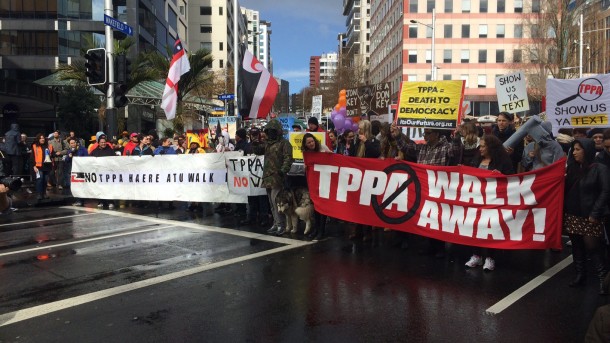TPP claims of economic gains without US debunked by senior UN economist

AFTINET | 20 September 2017
TPP claims of economic gains without US debunked by senior UN economist
A new economic study has completely undermined previous claims that the Trans-Pacific partnership agreement without access to the giant US market would still result in significant economic gains for the remaining 11 countries.
The study has emerged as the TPP-11 countries meet again in Japan on September 21 – 22 to negotiate possible changes to the TPP text without the US. Some governments only agreed to US proposals like increased monopolies on medicines and copyright, and foreign investor rights to sue governments, in order to gain access to the US market. They want to drop or renegotiate these clauses.
The new study by Rashmi Bunga, a senior economist working for the United Nations Committee on Trade and Development, has been published by the University of Munich.
The study is a detailed critique of the attached paper by Kenichi Kawasaki from the Japanese National Graduate Institute for Policy Studies. The Japanese and other TPP governments have been using this paper to argue that there would still be economic gains from an agreement between the 11 remaining TPP governments without access to the giant US market.
The UN economists paper shows that the economic modelling used in the Japanese paper rests on a series of completely unrealistic assumptions that ignore negative outcomes from trade agreements and always come up with a positive result (p. 3).
These assumptions include that there are no unemployment effects and no trade deficit effects, which are in fact two of the main real-world negative impacts resulting from trade agreements.
The UN study also shows that Japanese paper vastly exaggerates positive economic outcomes resulting from removal of non-tariff measures in the TPP, by assuming that all such measures will increase overall economic welfare and ignoring any negative effects (pp. 4-5). But some of these are the most controversial clauses on medicines and copyright monopolies that other governments are rejecting because of their negative effects.
The nontariff measures in the TPP include increased medicine monopolies which will delay the availability of cheaper medicines and increased copyright monopolies which will increase payments to copyright holders at the expense of consumers. Both the UN paper and studies by Australia’s Productivity Commission show that these will increase costs to governments and consumers, and have a negative effect on the economy as a whole.
In short, the study shows that both the underlying assumptions and the claims about nontariff measures contained in the Japanese paper completely undermine its claims of economic gains from the TPP 11 agreement.





